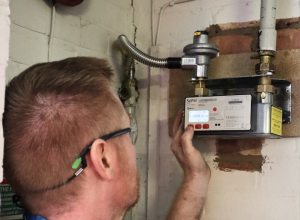IMServ Europe Ltd is one of the UK’s largest independent energy data management providers. Based in Milton Keynes, the company offers carbon and energy management solutions, helping organisations across all sectors to save energy, reduce costs and control carbon.
The company provides an all-inclusive portfolio that covers data collection, analysis, reporting and carbon management. With over 180,000 metering systems remotely monitored, we have extensive expertise in helping our customers reduce energy consumption and typically help them achieve up to 30% cost savings.
Steve Brown has been Managing Director of IMServ since July 2005, but has worked in a variety of senior Board-level positions within the company, including VP Advanced Services and Finance & Corporate Services Director since 2001. Prior to joining IMServ, Steve held a range of senior roles at the Thomas Cook Group. He is a Chartered Accountant with a degree in Industrial Economics from The University of Nottingham.
(1) Most of the major energy companies have increased prices recently, what can businesses do from a practical point of view to counteract these rises?
Energy prices have risen by approximately 58% since 2010 and this is putting immense financial pressure on UK businesses at a time when the UK economy is trying to claw itself out of recession. The number one priority is to strengthen energy saving strategies and policies by implementing a measurable energy saving programme, this is critical if businesses want to make informed decisions about their energy use, control carbon, save energy and reduce costs.
(2) Can energy management really make a difference to businesses?
IMServ works closely with many FTSE 250 organisations and companies within the commercial and industrial sectors advising on effective energy management solutions. Our analysis shows that businesses can typically save up to 30% overall by implementing a hands on monitoring, visualisation and control energy focus.
(3) What tends to be the key driver for companies implementing an energy management programme?
Typically it’s cost savings but proactively reducing an organisation’s carbon footprint is also important. As an example, independent analyst firm, Verdantix estimated BT saved £13 million per year from its energy monitoring and management strategies, with a carbon footprint reduction of 5%.
(4) Is energy management just for larger companies or can it make a difference to SMEs?
Definitely not! IMServ currently provides metering and data collection services to many hundreds of SMEs. We also work closely with consultancies, many of whom provide critical energy advice to enable these SMEs to save substantially on their energy costs. IMServ plays a critical role in this area by being a provider of energy data and intelligence to enable both consultancies and SME’s to deliver their services and manage their energy consumption more efficiently.
(5) Which sectors do you think are the worst offenders when it comes to wasting energy?
I believe that at present there are not any sectors which are implementing best practice across the board. For example the education sector certainly could be making significant savings simply by approaching energy usage more systematically. Schools have a vast array of opportunities for improving energy efficiency and gaining huge financial and environmental benefits, but one of the main challenges lies with understanding energy usage. In our experience schools could reduce energy costs by at least 30%. Schools, along with many businesses and organisations, rely on information from supplier bills which only provide aggregated consumption data. Like any other organisation, schools need to take a ‘whole building’ approach to get everyone from management to pupils involved.
(6) How important is energy intelligence?
Energy intelligence is incredibly important as organisations can’t manage what they can’t measure. By introducing sub-metering energy monitoring systems, a method of accurately monitoring separate uses of energy from building level down to a granular process level, organisations can accurately see what their energy usage is and where. This can then be addressed either through behavioural changes or more efficient energy use.
(7) Are UK businesses paying lip service to green issues?
From our experience it would seem that cost rather than green issues is the largest driver for our clients. Cost constraints of energy savings programmes are delaying investment, however staff engagement within our behaviour change programmes indicated that staff are motivated by green issues and can be engaged.
(8) What is the CRC Energy Efficiency Scheme?
Formerly known as the Carbon Reduction Commitment, the CRC Energy Efficiency Scheme is a mandatory carbon emissions reporting and pricing scheme to cover all organisations using more than 6,000MWh per year of electricity. It was introduced in April 2010, targeting emissions from large public and private sector organisations, with the aim of driving emissions reductions and incentivising the uptake of energy efficiencies. It has been very complicated but thankfully the Government is in the process of simplifying the scheme. The Government is currently considering abolishing the Performance League Table and the number of fuels that participants are obliged to report against has been reduced from 29 to just 2 – electricity and gas for heating. Cutting down on administrative costs and red tape will hopefully enable participants to save money and help them to save energy.
(9) What impact will an open water market have on organisations?
The Water Bill is expected to be passed over the next couple of years and proposes to give businesses and other non-household customers in the UK more choice by allowing them to switch water and sewage suppliers as currently water suppliers have the monopoly within their region. This has resulted in business customers having no supplier choice, being on non-negotiable tariffs, receiving poor customer service and overestimated bills. The proposed Bill proposes a more open and competitive market, allowing the 26,000 UK businesses that consume more than 50 mega litres (50 million litres) of water per year, to negotiate a better deal on their water bill. For organisations with multiple sites, it will allow the wholesale buying of water therefore reducing cost.
(10) What are your plans for the future direction of IMServ?
I am keen to continue to grow our energy monitoring and control business. This allows companies to save energy, reduce costs, control carbon, and importantly, be greener. With the launch of two new products this year, our focus is very much on enabling everyone to take control of their energy consumption. We are releasing a new controller, aimed at making building energy management affordable and efficient for all sites, including small ones. We are also upgrading our Energy Data Vision Software tool so that it will complement the changes in legislation and support our clients monitoring and control drivers.



